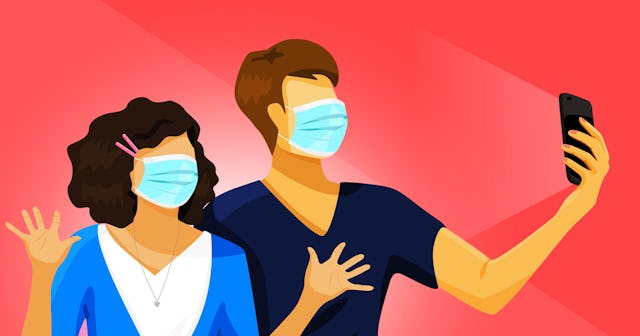Celebs Take To Social Media To Get People Vaccinated, But That Might Be Backfiring Now

Jennifer Aniston made headlines recently after an interview with InStyle in which she said that she believed people had a “moral and professional obligation to inform” others about whether or not they were vaccinated against COVID-19. She even mentioned that she’d let go of a few people in her life who either refused the vaccine or refused to disclose whether or not they’d gotten it.
Her comments created a bit of a stir even though she was just saying what many of us are already thinking about doing or have already done. I’m sure not hanging around any unvaccinated people except for my 11-year-old daughter, who isn’t vaccinated yet only because she’s not eligible. I blocked an ex-coworker on Facebook for trying to tell me I was making my son infertile and injecting trackers into him by allowing him to get vaccinated.
The gist of the pushback against Aniston was, if she’s protected, why should she care? Aniston responded via a post on her Instagram story, explaining her reasoning for why she doesn’t want to be around unvaccinated people even though she herself is vaccinated. She pointed out what should be obvious to all of us — that even if she is protected from severe illness, we now know that vaccinated people can still contract COVID-19 and infect others — others who have risk factors but can’t be vaccinated due to legitimate reasons not owing to conspiracy theory paranoia. “THAT is why I worry,” she said. “We have to care about more than just ourselves here.”
Right there with you, Jen.
Who Cares What Celebrities Think?
But … does that matter? Does it matter that I, a progressive who already shares the same views as Aniston, who already believes in science, agree with her? She has 37 million Instagram followers, but does it help at all for her to speak to them about her views on the COVID-19 vaccine?
A decade or more ago, it may have mattered quite a lot. In the past, celebrities have been able to influence public opinion and compliance on vaccines. The 13 colonies won the Revolutionary War in large part because George Washington mandated that all troops receive the variolation (a precursor to vaccination) against smallpox. Yes, that’s right — the United States of America literally would not exist without vaccine mandates.
Marko Geber/Getty
In the 1950s, Elvis Presley received the polio vaccine backstage at “The Ed Sullivan Show” to persuade his teenage fans to get innoculated. In the 1988, Roald Dahl, a famous author of children’s books, wrote a powerful and heartbreaking letter encouraging parents to immunize their children against measles — his 7-year-old daughter had died from the disease in 1962.
Things Are Different Now. And Not In A Good Way.
But the cultural zeitgeist seems to be shifting. The folks who are likely to oppose the vaccine for various conspiracy theory-related reasons either aren’t following Jennifer Aniston or don’t care to hear her or any other celebrity’s views on the topic. Ironically, they’ll claim she isn’t an expert, she’s just an actress, so she should stick to acting — as they hungrily consume every outrageous theory that comes stampeding down the YouTube pipeline from Dr. Fakey McFakerson and his colleague Dr. Discredited Dickface.
They simply do not care.
Celebrity-driven awareness campaigns used to help. But things seem different now. The internet makes it easy for people to feed their confirmation bias. Social media algorithms ensure anti-vaxxers’ feeds are filled with nothing but anti-vaxxer propaganda. They’re not going to inadvertently stumble upon peer-reviewed research. They’re even less likely to give two shits about what any celebrity says, much less one that’s a liberal.
Besides, when it comes to matters of public health, research from S Mawdsley of the University of Bristol suggests that it’s not simply about getting the message out. It’s about persuading the people who belong to a community to spread that message within their community. In other words, if none of them are even willing to listen, you’re not going to get through to any of them.
It’s not only teenagers who are heavily influenced by their peers.
And sometimes a celebrity sharing their opinion on an issue unrelated to their profession can result in the opposite of the intended effect. We’ve all witnessed when someone dead-set against a progressive idea hears a celebrity announce their support for that idea. It’s a whole lot of Nobody cares what you think, you’re just an actor and Shut up and do your job. Hearing a progressive / left-wing / liberal / out-of-touch celebrity attempt to relate to them in any way can shift a vaccine-wary conservative from apathy to outright resistance in a hurry. Now they’re not just wary — they’re also resentful and annoyed. They feel they’re being condescended to.
This isn’t any wonder, though. We’re talking about the same group of people who gleefully turn away from the experts who have spent decades studying virology and immunology in order to protect public health. These are people who will go out of their way — wayyyyyy out of their way — to find someone, anyone, who will confirm their already cemented point of view. They are happy to plough right through the dense crowd of experts and scientists who are frantically waving at them and trying to get their attention.
If these folks won’t believe experts, why on earth would we think progressive celebrities would have any chance of swaying them? Thanks for trying, I guess, but sadly it seems many of these folks may be a lost cause.
This article was originally published on